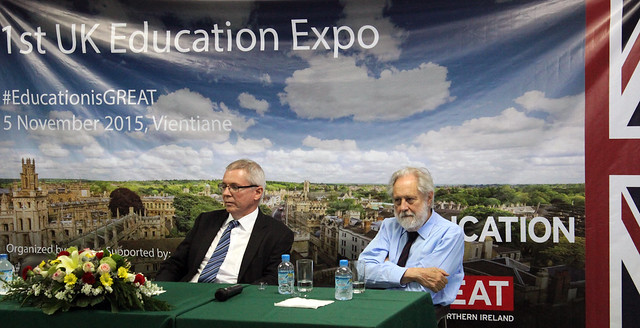Buddha’s famous quotation is a sentiment that the government of this predominantly Buddhist nation has taken to heart in transforming the educational prospects of Lao youth over the last two decades.
The results are impressive. Primary school enrolment has reportedly touched 98.5% in 2014, meeting Laos’ MDG target of universal coverage. In 1991, the rate was 58%. Secondary school enrolments have also risen to 78% for lower secondary (ages 11-14) and 45% for upper secondary (ages 15-18). Literacy rates now exceed 80% nationwide. From a limited tertiary sector before the 1990s, Laos now has four public universities.
Of course, the sector still has far to go. Drop-out rates are much too high, partly related to family demands in subsistence farming. There are only around 1000 secondary schools. Children from remoter communities have to board – if they can find a place – to continue their studies. Only a minority of Lao teenagers make it to university or college, which is sad given just how many talented and enthusiastic young Lao I’ve met in only a few months here.
The government plans to address these problems in its 8th and most ambitious 5 year National Social and Economic Development Plan. As part of its reform efforts, it has taken a strategic decision to promote the learning of English, making it a mandatory subject from grade 3 (age 8) in all state schools.
Not all international observers are convinced this should be a high priority for Laos given its basic education needs. But I think it is a farsighted move. English is the lingua franca of global business and a route to accessing international knowledge of all kinds, only a fraction of which has so far been translated into Lao. English is also the official language of ASEAN, which Laos will chair next year and whose economic integration will be crucial for the country’s prosperity.
Lao leaders, including H.E. the Deputy Prime Minister and Education Minister Dr Phankham Vipavanh, tell me their eventual aspiration is to make English the country’s second language. But they are realistic. For now, they want the UK government among others to help with English Language Training (ELT) for government ministries and teacher training support.
We have already responded, funding the MOES to develop English language materials for teachers. We are also collaborating with our Singapore Embassy colleagues to supply ELT to officials in two ministries this month. And early next year, we will jointly provide a second tranche of ELT, this time to support teacher training in the MOES. In both cases, British Council (BC) specialists will deliver the training.
Our Lao friends would like us to do more. Last week, I accompanied our Prime Minister’s Trade Envoy, Lord David Puttnam, together with a senior BC representative, to the MOES to confirm that a BC consultant will assess how we might offer more systematic ELT support in future. I will keep you posted as our plans develop. Please do send me any thoughts you have.
However, promoting ELT will only be one part of our educational engagement here I and I will be blogging about other aspects shortly.
Meanwhile, education should not be a one way process. Lord Puttnam brought with him a delegation of UK university representatives. Together they staged the first ever UK education fair in Laos but also explored opportunities to form dynamic new partnerships with their Lao counterparts. Our goals for the future are to increase the number of Lao students in the UK and to establish more and closer UK-Lao university cooperation and research projects.
One result I would like to see is a higher profile for Lao studies in the UK – and more British students learning Lao, a very rich and beautiful tonal language. Of course, I need to set a good example myself! I have been taking Lao lessons but would be the first to acknowledge I need to develop further – and I will. As Nelson Mandela so perceptively observed “If you talk to a man in a language he understands, that goes to his head. If you talk to him in his own language, that goes to his heart.”

